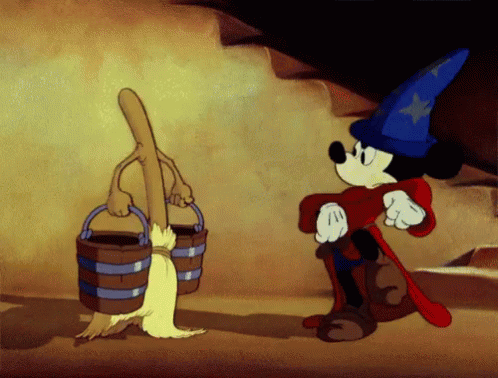The books with dangerous ideas
- Alain Simon Parizeau

- Feb 24
- 2 min read
Right. So, my son asked me why he couldn't read the Tintin book on the top shelf of our library. You see, I have a large bookshelf in the story studio, and the books are more or less arranged according to how high my son can reach. We told him that he could only read the books he could reach. As he experienced more of the world, he would grow wise enough to understand the meaning of the stories.
Information is meant to be shared, fundamentally, but certain ideas and stories might not be suitable for everyone. Also, some knowledge is better earned; as in learnt, and not accessed. Some of these ideas can be harmful and used as a weapon. The books on the top shelf are known as “the books with dangerous ideas", which, of course, sounds very appealing to a young person.
Have you heard the story about the Sorcerer’s Apprentice? There’s a version of this story in Walt Disney’s 1940s animated musical Fantasia. When, the Apprentice, played by Mickey Mouse, is left alone to complete his chores, decides to use his master's magic hat to enchant a broom to carry buckets of water for him. But his lack of magical experience leads to chaos; the enchanted broom multiplies and floods the workshop. Mickey Mouse breaks the rule to understand. I want to share that sense of wonder and ambition, but I also want to clarify the consequences of using power without understanding it. I think there’s value in knowing one's limits.
In Letters to a Young Poet, Rilke advised a writer to be patient with all that is unresolved in his heart and to try to love the questions themselves.
Be patient toward all that is unsolved in your heart and try to love the questions themselves, like locked rooms and like books that are now written in a very foreign tongue. Do not now seek the answers, which cannot be given to you because you would not be able to live them. And the point is, to live everything. Live the questions now. Perhaps you will then gradually, without noticing it, live along some distant day into the answer.
The right to knowledge is important, but how it’s attained is a different story. I think part of growing up is learning through experiences. The forbidden Tintin story, up there, along with the other forbidden fruits, are the many experiences of different people from around the world; in all its complexities. Waiting for their audience to reach the readiness needed to embrace its lessons. It’s a question all storytellers ask themselves; are they ready for this yet?










